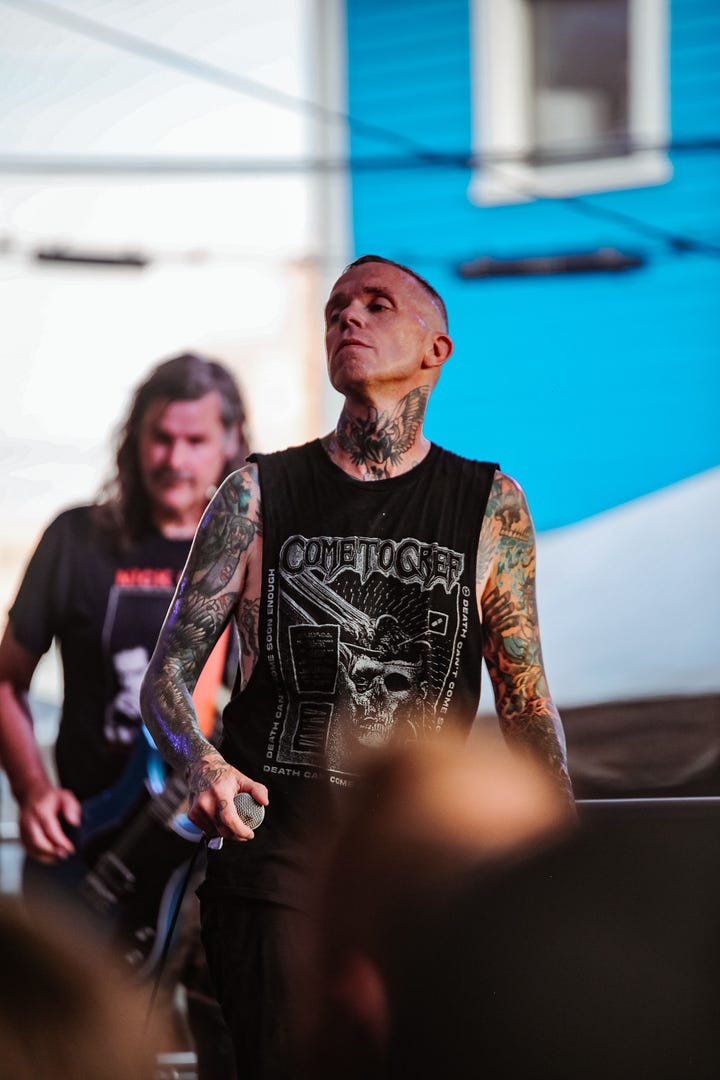Technique & Health for Aggressive Vocalists
Recently, just days apart, two vocalist friends inquired about technique and maintaining vocal health. I decided to share an amalgamation of my responses to them here in hopes it might help other aggressive vocalists as well.
Disclaimer: I am not a medical professional. This is simply what’s worked for me, drawn from personal experience. Take from it what you will.


Photography by Austin Maddox.
A Few Notes
I’m an aggressive, non-traditional vocalist. There are countless vocal techniques out there designed to preserve the voice, even for extreme styles, but I don’t follow any formal system. In truth, aggressive vocals are inherently "wrong" by most standards—and that’s the point. The damage is part of the sound.
In my experience, the more often I perform the “easier” it becomes physically. After long breaks, it’s really hard. I bleed—always have. That subsides after some days as my body adapts to the strain, but it’s very real. It’s a physical injury, akin to a guitarist/bassist shredding their fingers or a drummer pummeling their hands. I have to be honest about that: these are substantive injuries that come with the territory.
Preparation
I don’t practice typical vocal warmups consistently, though I’ve tried many. If inclined, I recommend experimenting—the internet is full of options. You might find one that works for you. I have friends that swear by them so I won’t knock it.
An hour or two before a set, I prepare ritualistically:
Change clothes
Stretch & address any physical pain/tension
Listen to our set
Practice basic cyclical breathing to ground myself—uniting mind and body before heading to stage
Rest & Recovery
Rest is crucial.
Casual conversation before a show can be as straining as performing. I try to remain quiet until I’m on stage. This sometimes gets misread as aloofness, but it’s the opposite—it's respect for the music, the audience, and the craft. If near silence gets me to the show at 100%, then that’s the call. Art over everything.
Most tours follow a strict routine: wake, load in, soundcheck, work, perform, load out, sleep. I head to bed as soon after the show as possible—that’s when the voice heals.
Diet is also another key. I avoid anything that can dry, irritate, coat, or upset the throat or stomach. I tend to eat once a day on tour, opting to be close to empty when heading to stage. Otherwise, I’ll vomit if I go too hard. That’s gross but real. I’m also all-in on immune support—we live in germ factories out on the road. Do everything you can to minimize what you perceive as risk.
Foods & Drinks I Avoid While Performing:
Unfamiliar food/drink (stick to what you know)
Salt
Dairy
Coffee
Processed sugars
Refined carbohydrates
High fructose corn syrup
Flavored syrups of any kind
Alcohol
Smoking
Excessive talking
Things That Do Work for Me While Performing:
Constant hydration
Vitamin: A, B6, B12, C, and E for recovery.
Potassium
Cordyceps
Caffeine
Turmeric
Ginger
Avocado
Bananas
Coconut water
Proteins
Healthy fats & anti-inflammatories
Cardio & exercise (when in doubt: take the stairs)
Monitors: In-Ears vs. Wedges
Stage Wedges — Pros:
Natural ambient stage sound
Stronger audience/band/music connection
Provides a natural barrier for a ruckus crowd
Stage Wedges — Cons:
Unpredictable build/sound
Equipment failure risks
Mic cable tangle hazards
Despite the downsides, I still prefer traditional wedges for the pros above.
In-Ears — Pros:
Control over personal mix
Reduces bleed into microphones
In-Ears — Cons:
Fragile, dependent on battery/frequency stability
Setup sometimes requires an engineer
Limits the physicality of performance
Technical failure mid-set can be catastrophic
I’ve used in-ears for the Converge: Bloodmoon sets with positive results—especially for reducing bleed for our drummer. But they do disconnect me from the audience, and in a physically intense show, they don’t stay put. For me, that makes them more of a distraction.
Ear Plugs
I don’t wear ear plugs while performing, for two reasons:
Custom molded, high-end, and low-end plugs have all fallen out of my ears mid-set, breaking my focus.
With most ear plugs, the internal volume (my own voice in my skull) becomes overwhelming and distracting when I have molded plugs in.
I’m fully aware I’m losing my hearing. I’ve been evaluated before. Certain frequency ranges—especially cymbal sheen (4–6k Hz)—are essentially gone for me. I’ve made peace with it. But I do encourage you to wear them if you can. Protect what you can while you can.
Managing Stage Volume
I keep my monitor mix simple: kick, snare, guitar, and main vocal.
This makes on-the-fly adjustments easier. If I’m not getting enough vocal, I start by reducing the guitar—it’s the most dynamic variable. If that doesn’t help, kick and snare then go away, leaving only vocals.
Be aware of compression and limiting at the board level—it can ruin your sound. If I hear signs of this during soundcheck, I’ll work with an engineer to fix. Some powered monitors have built-in limiters that make things worse. Even experienced engineers may overlook these factors. Be patient but persistent in problem solving.
If everything is working on stage, step away from the monitors and explore the space. Learn the sound pockets. Feel what your body is doing vocally in each one. That way, even if you can't hear yourself later, you’ll know how it should feel. Soon you’ll be able to do it without the need to hear yourself fully.
Mic Handling
I often “cup” the mic with both hands—not to alter tone, but to protect my face. I’ve chipped teeth, cut hands, and dealt with serious infections from mic-related injuries. A two-hand grip gives some control and safety.
Mic Equipment & Technique
I bring my own microphones (Shure SM58s or SM58Bs) and try to travel with three:
A: Primary mic (on stage)
B: Backup mic (on stage)
C: Emergency mic (packed)
Shure has a great repair/replacement policy—use it.
I also carry spare windscreens, changing them out when they are failing. I tape cables to my mics to prevent disconnects. Tape them your way, not someone else’s.
I do not use wireless mics.
Mic Cleaning / Maintenance
When able, inspect and clean your microphones; it’s your responsibility.
Check them at soundcheck and maintain them regularly.
Confidence in your gear is non-negotiable.
With cleaning; alcohol, peroxide, and tea tree oil are your allies.
Working with House Engineers
Introduce yourself. Give a heads-up about potential issues. Share simple hand signals (“guitar up,” “vocal down,” etc) Let them know if you’re not at 100% for any reason as they can be your lifeline during a show.
Respect the house crew—it matters. Good energy now means better support later. If things get off on the wrong foot for whatever reason, get on the right one quickly or you are both in for a long night.
If You Can’t Hear Yourself…
If possible, ask the band to turn down—Sometimes a loud stage doesn’t let the PA do its job. Lowering stage volume allows the PA to properly support the room it was designed for.
I also try to angle monitors away from drummers to avoid affecting their mix and own show experience.
Also consider additional monitors—front, side fills, or even behind you. You can also set up monitors to your left and right akin to a “runway”and eliminate them in front (Rollins did this for decades).
It is a big ask, but if your band members are game, request vocals in all of the front wedges. This will give you the freedom to move around and still hear. It will also probably break up your band immediately.
Vocal Compression
Mellow vocal compression can help keep vocal output consistent. It doesn’t work for me in most settings but for others (especially mellower vocalists) it may be the right tool for control.
I hope some of this was helpful to you all.
Best of luck with your own music,
–J.
Converge, on tour:
Oct 05 Birmingham, AL - Furnace Fest
Dec 13. Boston, MA - Roadrunner Boston at Saddest Day 2025
Converge
Touche Amore
Coalesce
The Hope Conspiracy
Special Guest TBA 9/21
Soul Glo
Year Of The Knife
Stress Positions
Wormwood
Live Art Exhibit featuring Jacob Bannon, Thomas Hooper, Nightswim Project, and more. Vendors, Records, Merch, Non-Profits, and more.
Music & Merch
www.jacobbannon.com
www.convergecult.com
www.umbravitae.com
www.wearyourwounds.net
www.bloodfromthesoul.com
www.deathwishinc.com




This is very helpful! I’m about to embark on a 5 day tour with my band Dazzling Killmen and I never used to have problems blowing out my vocal cords…but now I do. I’m 61 years old. This helps. Thank you.
Very informative and I’d say you’re a pretty trusted source. I’ve been trying to figure out a warm-up myself, it seems to take me half a song to get my voice where I want it to be